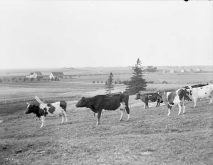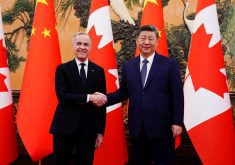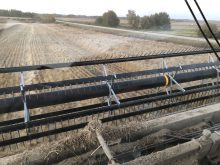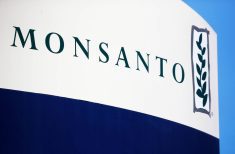Our American cousins are like a lot of extended family.
We might love them, most days. But sometimes we watch their antics, scratch our heads, and wonder what the heck they’re thinking.
And there aren’t a lot of issues being pursued through their political system that make less sense than the perennial push for mandatory country-of-origin labelling (COOL) on meat.
Right now, U.S. meat packers are allowed to import live cattle, process them and label the resulting meat a U.S. product. That’s in line with labelling laws in many other jurisdictions, including Canada. A 2013 WTO ruling struck down the original mandatory country-of-origin labelling as non-compliant with the U.S.’s trade obligations — eventually. It went a couple of rounds under the trade authority and was finally repealed in 2015.
But COOL is the thing that won’t die. Like Arnold Schwarzenegger’s cyborg-assassin Terminator character of cinema fame, you can shoot it, run a car over it, blow it up — you could probably even land a grand piano on its head — and it would still come back for more.
The answer to why it won’t die lays with the peculiar nature of U.S. politics, with its populist bent and outsized power granted to farm states through the Senate.
The chief proponents of COOL have been the members of R-CALF USA (Ranchers-Cattlemen Action Legal Fund United Stockgrowers of America), which bills itself as “Fighting for the independent U.S. cattle producer.” However, they appear to be largely a fringe group, with just 5,000 or so members, out of a total of more than 750,000 operations in the U.S. with beef cattle.
It doesn’t seem like anyone else in the cattle business wants it on the south side of the 49th. Prior to COOL being repealed to comply with the WTO ruling, everyone from the American Meat Institute to the U.S. National Cattlemen’s Beef Association (NCBA) were lined up against it. Those same groups continue to voice their opposition.
NCBA vice-president of government affairs, Ethan Lane, told U.S. media recently that COOL “… was not successful in generating additional revenues for producers… “ and he added that he doubted there was a way to make the proposed new regulations trade compliant.
So how can a small but vocal group throw a monkey wrench – repeatedly — into the inner workings of a continental beef market that features trade, flowing both directions, worth billions of dollars a year?
The answer to that question requires some pondering of the collective U.S. psyche and the myths they appear to believe about themselves.
One of the central tropes of their popular culture is the Old West, with cattle drives, land barons and gunfights on Main Street at high noon.
That makes the cattlemen of today the inheritors of a powerful pile of public goodwill, and they’re seen as sympathetic characters.
Then you have a general public that, like our own, is now very distanced from the country’s agrarian past. That makes them susceptible to pitches about hard-pressed small cattle operators going up against those nasty multinational meat companies bringing in foreign cattle.
And then, of course, there’s the appeal that “people have a right to know what they’re eating, and where it comes from.”
On its face, that seems like a reasonable argument. After all, who would argue that more information is a bad thing? The entire idea of a marketplace is that, ideally, an informed buyer meets an informed seller and a fair deal is struck.
But that assumes anyone actually wants this information, and it’s pretty clear nobody in the U.S. is truly crying out for it. Country-of-origin labelling is possible under the existing rules. But it appears not enough people want it that any of the major packers are interested in taking the plunge.
What’s important to most people, including U.S. consumers, seems to be a product that’s safe, healthy and was raised humanely and processed in a way that ensures food safety. Whether the animal was raised outside Medora, Man. or Medora, N.D., seems to largely be a non-issue for most consumers.
In fact, the status quo may provide a ready-made market niche for something many Americans have expressed interest in — more independent meat packers.
In a lot of ways, COOL seems like a solution in search of a problem. But that’s never stopped an enterprising politician from attempting to make some electoral hay.
Which means Canadian livestock producers may well find themselves, once again, side-swiped by U.S. politics.
Making sure that doesn’t happen is going to be a tall order, and a big part of Canada’s response should be getting ready for that day to come.
The NCBA spokesperson is probably right that making any mandatory COOL program trade compliant is a tall order.
We need to be ready to drop a WTO challenge the day it comes into effect.
















